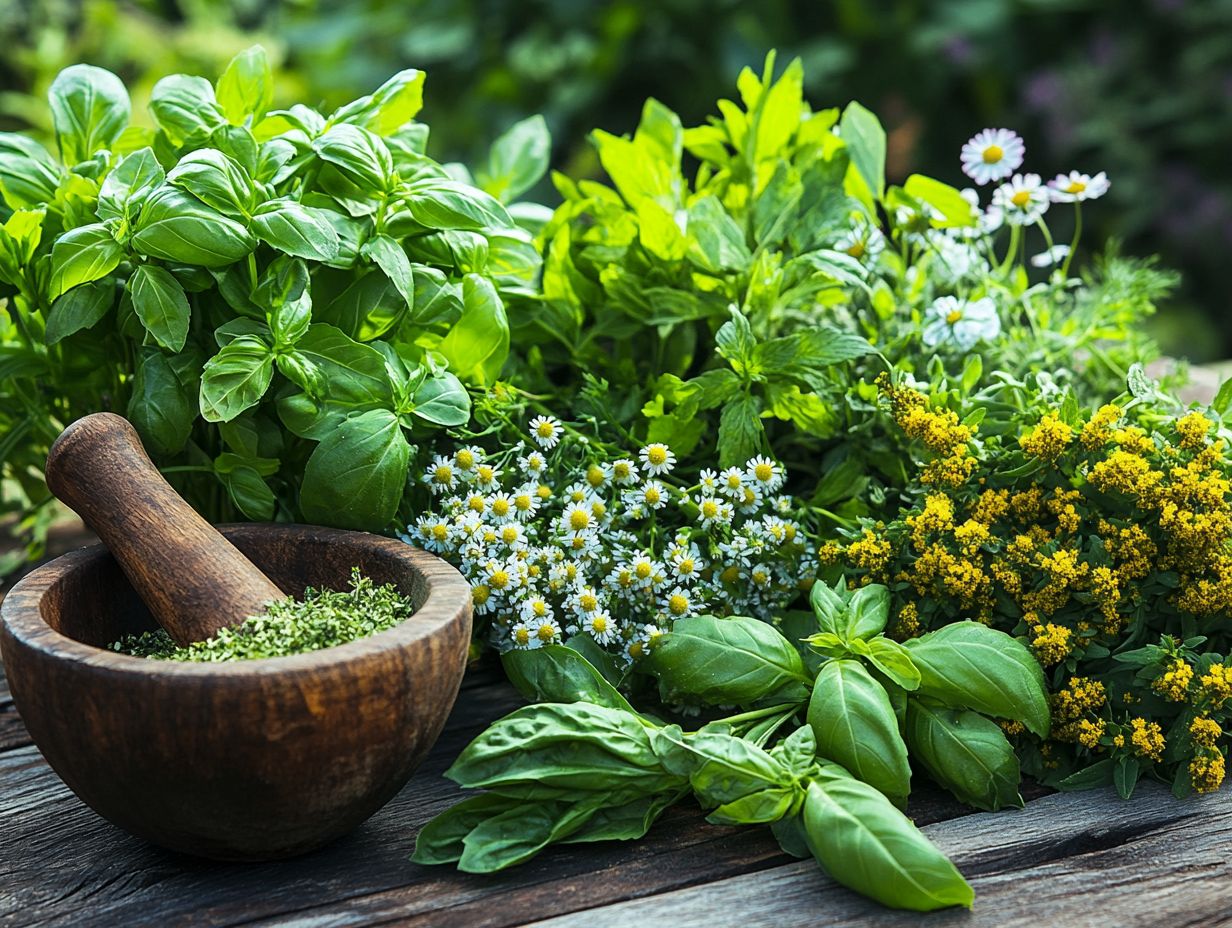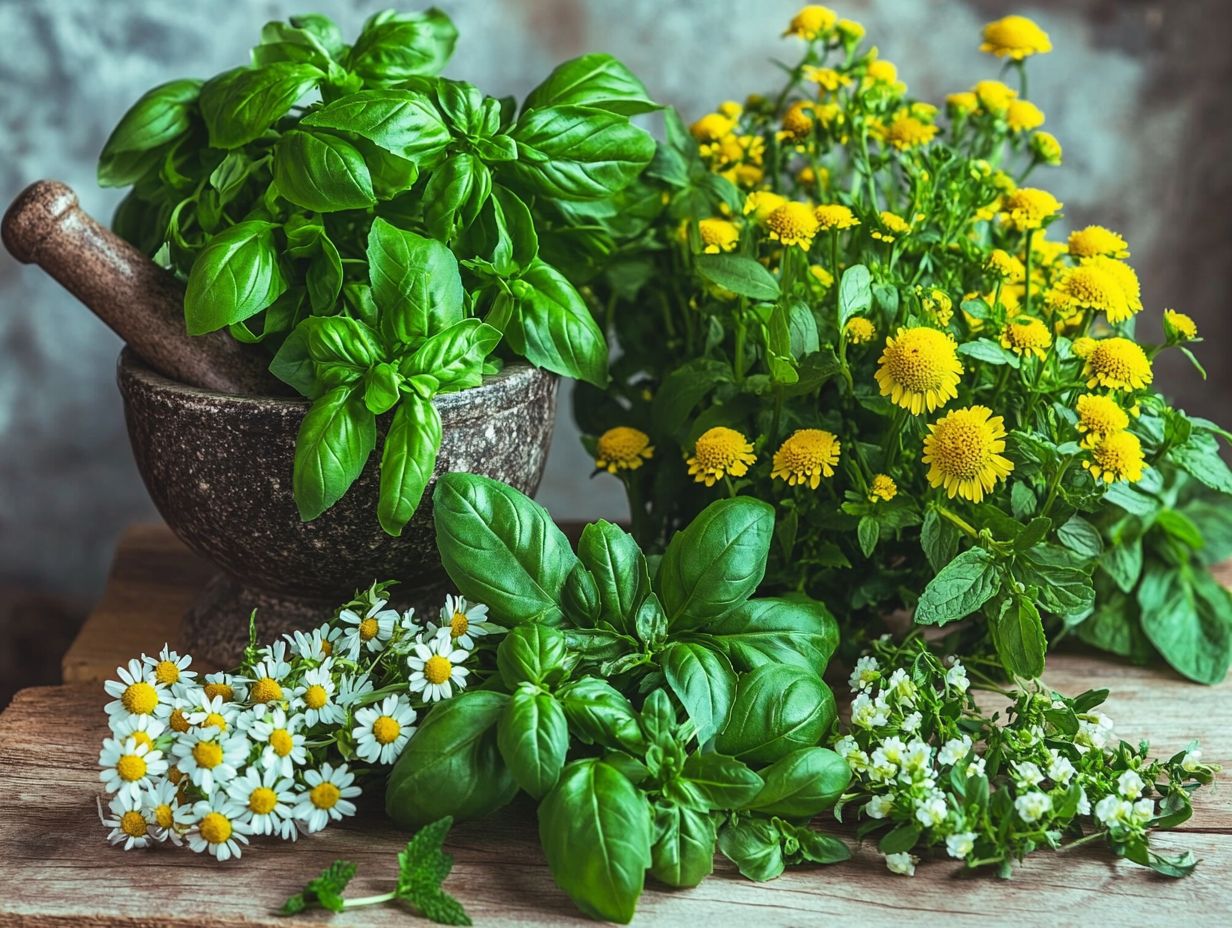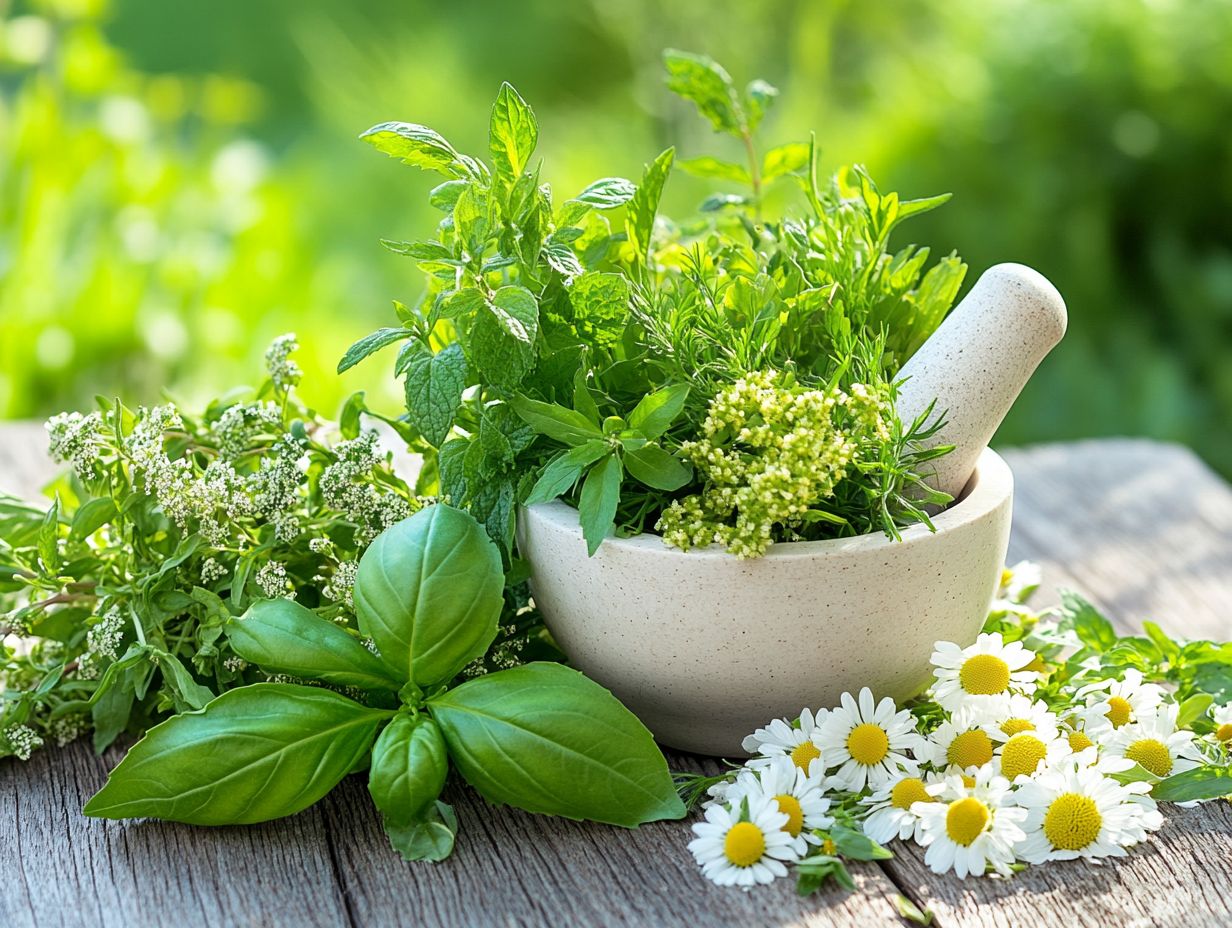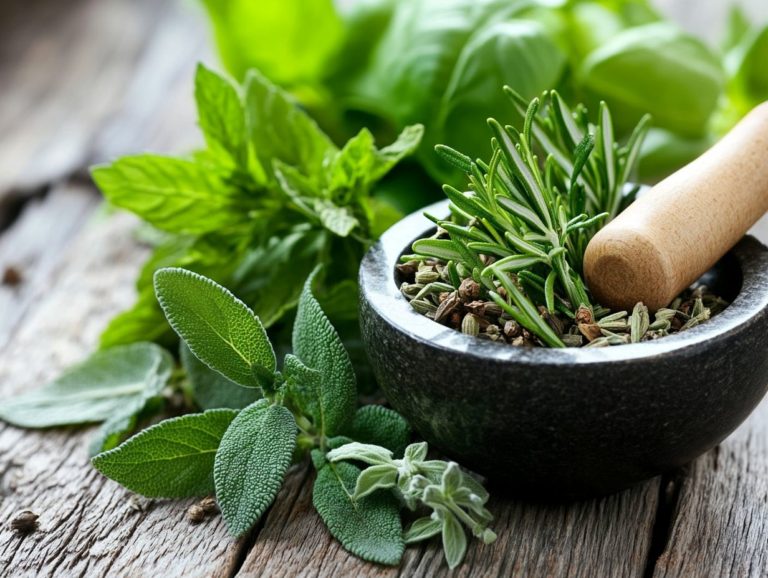How Do Herbal Remedies Work?
Herbal remedies have long been a cornerstone of traditional medicine, providing you with natural alternatives for an array of health concerns.
From soothing teas to potent tinctures, these remedies come in various forms and work uniquely within your body. This article delves into what herbal remedies are. The different types available can enhance your well-being, addressing important health matters.
Safety considerations and tips for selecting the right remedy for your needs are also important. Dive into the exciting world of herbal healing today!
Contents
Key Takeaways:

Understanding Herbal Remedies
Understanding herbal remedies invites you into a world of diverse practices and principles. These practices harness the power of plant parts and active ingredients for potential health benefits.
These time-honored remedies have been embraced across cultures, including ancient healing systems from India and China. They serve as both alternatives and complements to conventional medicines.
While herbal remedies can provide effective solutions for many health concerns, you should approach their use with care. Be aware of potential issues and risks when buying products.
The landscape of herbal remedies is abundant with options tailored to meet your self-care needs.
What are Herbal Remedies?
Herbal remedies are natural treasures derived from medicinal plants. They come in forms like extracts, teas, tinctures, and capsules, all crafted to enhance your health.
These remedies tap into different parts of the plants leaves, roots, flowers, and seeds to unlock their unique healing properties. For instance, leaf extracts can effectively address respiratory concerns.
Roots are often used to bolster digestive health. Herbal teas, celebrated for their calming effects, typically combine multiple plant parts for wellness.
Tinctures, or liquid extracts made from herbs, provide concentrated solutions for quicker absorption by your body.
By embracing these diverse forms of herbal products, you can manage a variety of health risks, nurturing a holistic approach to your well-being.
Types of Herbal Remedies
The realm of herbal remedies is richly varied. You can find options like herbal supplements, teas, tinctures, and carefully crafted formulations.
These adhere to herbal registration guidelines, harnessing the unique properties of different plant extracts for your health benefits.
Herbs, Teas, Tinctures, and More
Herbs, teas, tinctures, and a variety of herbal remedies each provide distinctive ways to extract and harness the active ingredients found in medicinal plants. These different formats offer flexibility in preparation and cater to your individual preferences and health needs while following safety standards.
Take herbal teas, for example. Often brewed from dried leaves, flowers, or roots, they create a soothing ritual that hydrates and delivers the health benefits of plants like chamomile or peppermint.
Tinctures are crafted by steeping herbs in alcohol or vinegar, resulting in a concentrated form ideal for those seeking powerful remedies in smaller doses.
If you’re looking for convenience, herbal capsules make it easy to incorporate potent extracts into your daily routine, helping manage various conditions. If you’re curious about how long it takes for herbal remedies to work, each method has unique characteristics and therapeutic applications, allowing you to choose the approach that best aligns with your health journey.
How Do Herbal Remedies Work?

Herbal remedies work through various exciting ways, primarily using active ingredients from medicinal plants. These compounds are targeted to address specific health conditions and may lead to known side effects if not used properly.
Mechanisms of Action
The mechanisms behind herbal remedies involve a fascinating interplay between active ingredients and how your body works, showcasing their treatment efficacy.
These interactions modulate gene expression and influence enzyme activity and neurotransmitter levels, all contributing to your overall wellness. For instance, compounds like flavonoids found in specific herbs act as potent antioxidants, neutralizing free radicals and reducing oxidative stress at the cellular level, which is crucial for understanding the safety of herbal medicine.
Alkaloids engage with receptors in your nervous system, offering relief from pain and inflammation, especially for those dealing with serious health conditions. Grasping these complex molecular interactions bolsters the credibility of herbal medicine and underscores its potential as a complementary approach within modern therapeutic practices. If you’re curious about the efficacy of herbal solutions for weight management, explore whether herbal remedies are effective for weight loss, particularly when used alongside pharmaceutical medications.
Benefits of Herbal Remedies
The benefits of herbal remedies extend from enhancing overall wellness to effectively addressing specific health conditions. This showcases their potential as valuable alternatives or complements to conventional medicines.
Embracing these natural solutions can enrich your health journey, offering a holistic approach that aligns with your well-being goals while ensuring you are aware of any potential adverse reactions.
Health Conditions They Can Treat
Herbal remedies have gained recognition for their remarkable ability to address a diverse range of health conditions, spanning from mild issues to more serious ailments, often serving as a complementary approach to conventional medicine.
- Anxiety and depression can find relief through herbs like St. John’s Wort, with numerous studies supporting its effectiveness in alleviating symptoms.
- Ginger has been shown to be an effective remedy for nausea, especially for pregnant women and individuals undergoing chemotherapy.
- Turmeric, with its active compound curcumin, has potential benefits in managing arthritis due to its powerful anti-inflammatory properties.
- Anecdotal evidence suggests that using echinacea for the common cold can enhance immune function.
Explore these herbal remedies today to discover how they can enhance your wellness. Remember to consult a healthcare provider before starting any herbal remedies.
Safety and Side Effects of Herbal Remedies
The safety and side effects of herbal remedies are paramount for you as a user. It’s essential to understand the possible risks carefully and ensure that you adhere to high-quality products and stay informed about herbal medicine regulations.
This diligence will help you avoid any unwanted effects and enjoy the benefits these remedies can offer when following established quality control measures.
Things to Consider Before Using

Before you dive into the world of herbal remedies, it’s crucial to understand possible side effects and have a chat with a healthcare provider or herbal medicine practitioner to ensure your safety.
Understanding how herbal treatments interact with prescription medications is key. Some herbs can either enhance or diminish the effects of these drugs, potentially leading to unexpected results, including allergenic reactions. It s important for you to assess your individual health concerns, such as allergies or any pre-existing medical conditions, which could impact both the effectiveness and safety of herbal solutions.
Talking with a qualified practitioner helps you choose the right herbs and spot any potential risks. This paves the way for you to make safer, more informed decisions about your natural health practices.
Choosing the Right Herbal Remedy
Selecting the ideal herbal remedy requires you to grasp your unique health concerns and pursue treatments that resonate with your health objectives, all while prioritizing the safety of herbal medicine.
Factors to Consider for Optimal Results
When seeking optimal results with herbal remedies, consider several key factors: understand quality standards, choose the right herbal formulation, and prioritize consumer safety by adhering to FDA regulations throughout the purchasing process.
Beyond these foundational aspects, it’s essential to explore the criteria that influence the effectiveness of herbal treatments. Knowing where the herbs come from plays a critical role in their potency, so understanding how the herbs are cultivated, alongside learning if herbal remedies can replace prescription meds, is of utmost importance.
Quality control measures like third-party testing and standardization processes should never be overlooked, as they ensure that the remedies meet stringent safety and efficacy benchmarks mandated by herbal medicine regulations. To further understand the effectiveness of these remedies, you may want to explore if there is scientific evidence for herbal remedies. Recognizing your individual health needs is also important, such as pre-existing conditions and potential allergies, to help you select the most suitable formulations tailored to your unique circumstances.
Frequently Asked Questions
How Do Herbal Remedies Work?
Herbal remedies work by utilizing the medicinal properties of plants to help treat various health conditions.
What are herbal remedies?

Herbal remedies are natural and traditional medicines made from herbal extracts and plant parts.
Do herbal remedies have any side effects?
Yes, some herbal remedies may have known side effects, just like any other medication. It is important to consult with a healthcare provider before trying any herbal remedy, especially when considering herbal therapy for serious health conditions.
How do herbal remedies differ from prescription drugs?
Herbal remedies are typically made from natural ingredients, while prescription drugs are man-made chemicals. Herbal remedies also tend to have a more holistic approach to treating health matters and self-medicated conditions.
What are the benefits of using herbal remedies?
Some potential benefits of using herbal remedies include fewer severe side effects, effective treatments, and a more natural approach to healing.
Can herbal remedies be used in conjunction with other medications?
It is always important to consult with a healthcare provider before combining herbal remedies with other medications, as there may be potential interactions or risks.






